

Vietnam's Internet Censorship. Internet freedom has gone from bad to worse in Vietnam as an online censorship law known as Decree 72 went into effect this month.
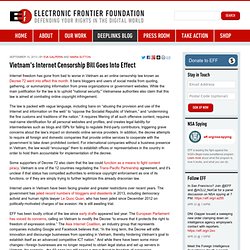
It bans bloggers and users of social media from quoting, gathering, or summarizing information from press organizations or government websites. While the main justification for the law is to uphold "national security," Vietnamese authorities also claim that this law is aimed at combating online copyright infringement. Psr1300001a - censored.pdf. FilmMart 2012: Powerful Asian Alliance to Fund ‘Micro Movies’ (Exclusive) HONG KONG - Hong Kong’s Salon Films, the China International Television Corporation (CITVC), Fox International Channels and Japanese entertainment conglomerate Yoshimoto Kogyo have joined forces to create a new platform and distribute television movies across Asia.
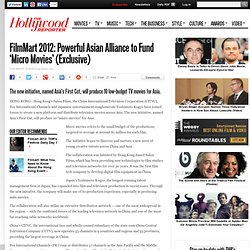
The new initiative, named Asia’s First Cut, will produce 10 “micro-movies” for Asia. Micro movies refers to the small budget of the productions, targeted to average at around $1 million for each film. The initiative hopes to discover and nurture a new wave of young creative talents across China and Asia. The collaboration was initiated by Hong Kong-based Salon Films, which has been providing new technologies to film studios and television networks for over 50 years. It was the first film tech company to develop digital film equipment in China. Japan’s Yoshimoto Kogyo, the longest-running talent management firm in Japan, has expanded into film and television production in recent years. 送饭党. Arts Education in Singapore Moves to Center Stage. Myanmar to China Limits Censorship. Many Faces Censorship China. South Korea Film Cheonan Sinking. By Steven Borowiec / 17 September, 2013 A recently released film in South Korea set out to spark a discussion on free speech in the country, and amid opposition and cancelled viewings, it has done just that.

Project Cheonan Ship is a film on the aftermath of the 2010 sinking of the Cheonan warship, a South Korean navy submersible that went down in waters near North Korea. South Korea concluded that a North Korean torpedo was the cause of the sinking, though North Korea denied any involvement. The film features experts in a range of fields offering possible alternative causes of the ship’s sinking. Banned in China. Micro movies beat censors. Filmmakers are tackling difficult subjects and taking artistic risks in short films consumed on mobile phones.
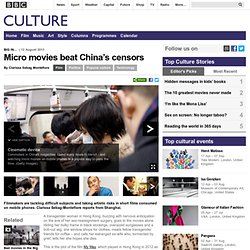
Clarissa Sebag-Montefiore reports from Shanghai. A transgender woman in Hong Kong, buzzing with nervous anticipation on the eve of her sex-reassignment surgery, goes to the movies alone. Hiding her bulky frame in black stockings, oversized sunglasses and a bob-cut wig, she window shops for clothes, meets fellow transgender friends for coffee – and calls her estranged ex-wife who, tormented by grief, tells her she hopes she dies. This is the plot of the film My Way, which played in Hong Kong in 2012 as part of an omnibus called Beautiful, sponsored by the Hong Kong International Film Festival (HKIFF). The former British colony, now a Special Administrative Region of China, has greater artistic and press freedom than the mainland under the policy of ‘one country, two systems’.
Nepal: Social Media As A Civic Activism Tool. Following events in the Middle East and in India, where young people harnessed the power of social media to achieve civic goals, Nepali youngsters concerned about the country's political chaos are eagerly embracing this technology.

On Saturday May 7, 2011, hundreds gathered at a public square in Kathmandu demanding that the constitution be drafted by the May 28 deadline. This event was unique to Nepali activism and political scene because social networking site Facebook played vital role in organizing and encouraging the participants. Horizons: Dialogue and dissonance on cyberspace. Horizons: Chinese and Malaysian citizens air grievances through White House website. What is Happening to Weibo? The arrest of investor and prominent online commentator Charles Xue for soliciting prostitutes in August was thought to be a veiled warning to Internet celebrities. More recently, authorities have been more direct in cracking down on his and others’ online activities in what may be a move to gain greater control over Weibo, China’s popular Twitter-like microblogging platform. The multi-pronged campaign, which includes making public examples of certain celebrities and also moving to restrict more grassroots expression, may change the way that Chinese use the Internet to comment on public affairs.
Recent developments, including Charles Xue’s detention, are extensions of a broader campaign, ostensibly against rumor spreading online. On August 10, China Central Television (CCTV), the country’s state-run network, hosted a forum on Internet celebrities’ social responsibility. Human Flesh Search. China Launches Anti-Corruption Site. The new website, www.ccdi.gov.cn, is an operation managed by two government bodies, the Central Commission for Discipline Inspection and the Ministry of Supervision.
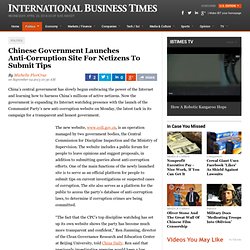
The website includes a public forum for people to leave opinions and suggest proposals, in addition to submitting queries about anti-corruption efforts. One of the main functions of the newly launched site is to serve as an official platform for people to submit tips on current investigations or suspected cases of corruption. The site also serves as a platform for the public to access the party’s database of anti-corruption laws, to determine if corruption crimes are being committed.
“The fact that the CPC’s top discipline watchdog has set up its own website shows the party has become much more transparent and confident,” Ren Jianming, director of the Clean Governance Research and Education Center at Beijing University, told China Daily. The Grass-Mud Horse Lexicon - China Digital Space. “I'm a grass-mud horse.”
Translating the Resistance Discourse of Chinese Netizens. Grass-mud horse - China Digital Space. China's Food Delivery Party. They created an online trading platform equipped with a transparent, decentralized management system.
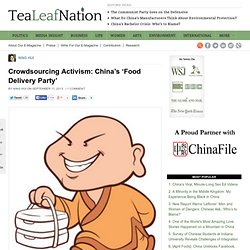
Reporters use weibo expose corruption. Fine Line. The pen name of Mo Yan, the Chinese writer who will be awarded this year’s Nobel Prize in Literature on Monday, means “don’t speak.”
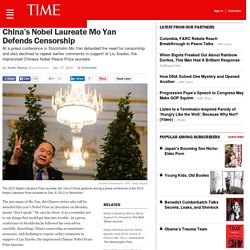
He says he chose it as a reminder not to say things that would get him into trouble. Most Influential Emotions on Social Networks Revealed.